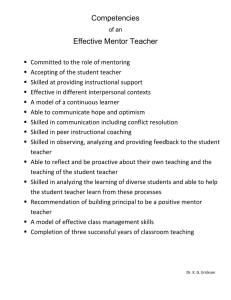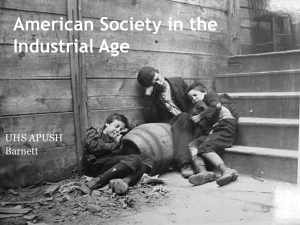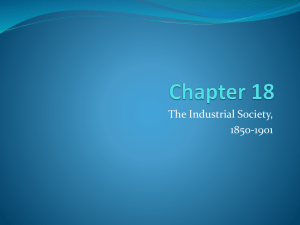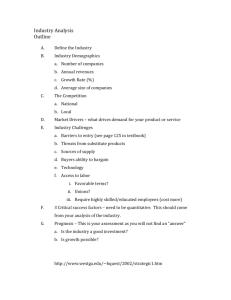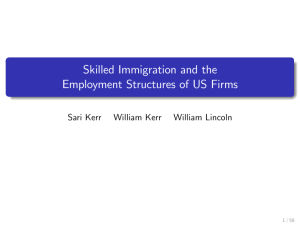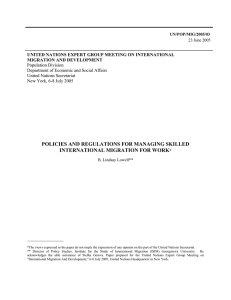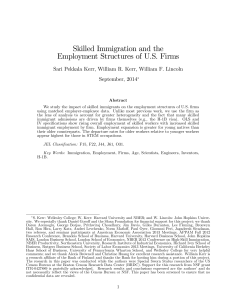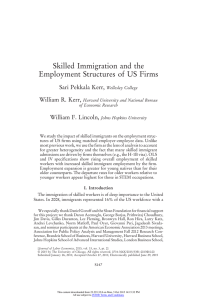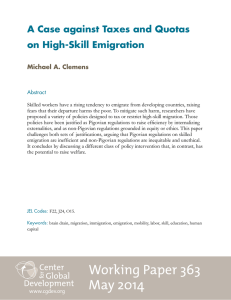Are We Losing the Global Race for Talent?
advertisement
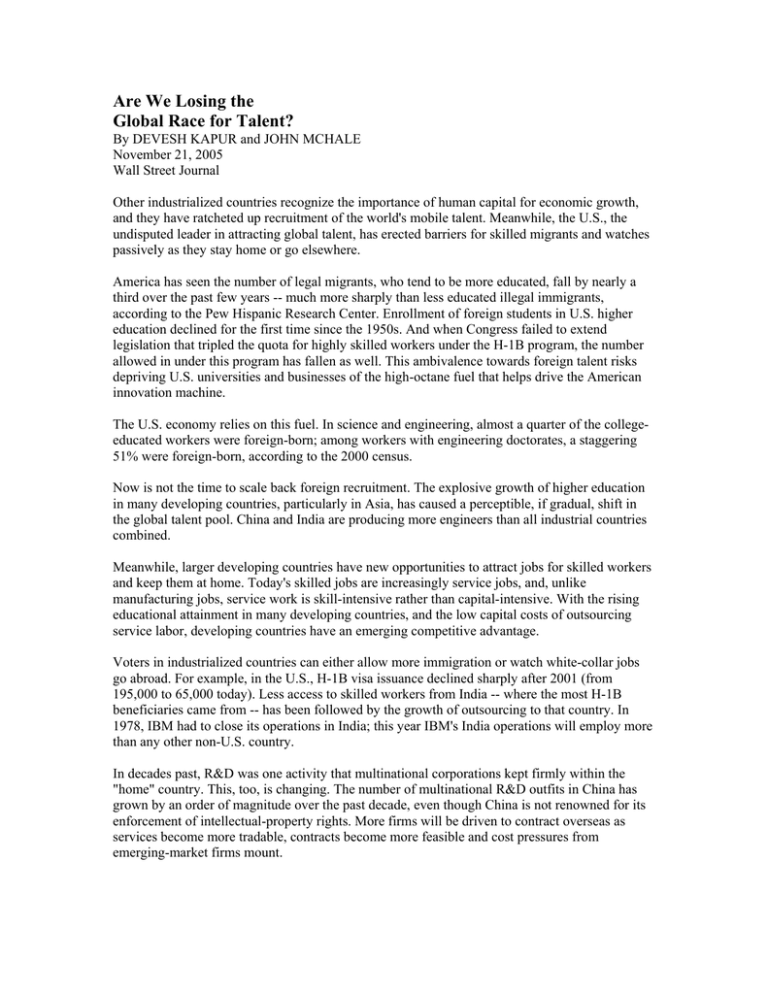
Are We Losing the Global Race for Talent? By DEVESH KAPUR and JOHN MCHALE November 21, 2005 Wall Street Journal Other industrialized countries recognize the importance of human capital for economic growth, and they have ratcheted up recruitment of the world's mobile talent. Meanwhile, the U.S., the undisputed leader in attracting global talent, has erected barriers for skilled migrants and watches passively as they stay home or go elsewhere. America has seen the number of legal migrants, who tend to be more educated, fall by nearly a third over the past few years -- much more sharply than less educated illegal immigrants, according to the Pew Hispanic Research Center. Enrollment of foreign students in U.S. higher education declined for the first time since the 1950s. And when Congress failed to extend legislation that tripled the quota for highly skilled workers under the H-1B program, the number allowed in under this program has fallen as well. This ambivalence towards foreign talent risks depriving U.S. universities and businesses of the high-octane fuel that helps drive the American innovation machine. The U.S. economy relies on this fuel. In science and engineering, almost a quarter of the collegeeducated workers were foreign-born; among workers with engineering doctorates, a staggering 51% were foreign-born, according to the 2000 census. Now is not the time to scale back foreign recruitment. The explosive growth of higher education in many developing countries, particularly in Asia, has caused a perceptible, if gradual, shift in the global talent pool. China and India are producing more engineers than all industrial countries combined. Meanwhile, larger developing countries have new opportunities to attract jobs for skilled workers and keep them at home. Today's skilled jobs are increasingly service jobs, and, unlike manufacturing jobs, service work is skill-intensive rather than capital-intensive. With the rising educational attainment in many developing countries, and the low capital costs of outsourcing service labor, developing countries have an emerging competitive advantage. Voters in industrialized countries can either allow more immigration or watch white-collar jobs go abroad. For example, in the U.S., H-1B visa issuance declined sharply after 2001 (from 195,000 to 65,000 today). Less access to skilled workers from India -- where the most H-1B beneficiaries came from -- has been followed by the growth of outsourcing to that country. In 1978, IBM had to close its operations in India; this year IBM's India operations will employ more than any other non-U.S. country. In decades past, R&D was one activity that multinational corporations kept firmly within the "home" country. This, too, is changing. The number of multinational R&D outfits in China has grown by an order of magnitude over the past decade, even though China is not renowned for its enforcement of intellectual-property rights. More firms will be driven to contract overseas as services become more tradable, contracts become more feasible and cost pressures from emerging-market firms mount. U.S. firms will increasingly have to compete against other industrial nations to attract skilled migrants. American success in attracting global talent is being emulated by other countries. Canada, Australia and the U.K. have all reformed immigration policy to better target and increase their share of skilled immigrants. Security concerns are valid; but the U.S. has made progress in reducing security-screening-related backlogs. Do all these highly skilled immigrants increase global insecurity? Since the most sought-after immigrants are also the ones most capable of driving institutional development at home, "creaming" the most talented, especially from small, poor countries, risks undermining their political and economic development and, in the worst case, leading them to become failed states. Against this view, some argue that remittances compensate for the brain drain. But while the increasing amounts of money sent home do help, the argument is mistaken on three counts: First, remittances come mostly from low-skilled workers. Physicians and managers are far more likely to come from the institution-building middle-class whose families back home need money much less. Second, money alone is not enough. Just as foreign-aid has not guaranteed development, countries that receive the most remittances relative to the size of their economy -from Haiti to Somalia -- have not developed as a result. Finally, remittances mainly augment consumption, though there is evidence that they fund education, and microbusinesses. The lack of broader investment is no surprise given weak institutions, a consequence (and cause) of humancapital flight. Pressuring rich countries to stop admitting people, however, is no way to raise living standards of those born in developing countries. Through policy we can, however, make it easier for migrants to stay connected and act as a positive force for political and economic development in their home countries. Both sending and receiving countries benefit most when migration is temporary. Critics point out that temporary migration is often anything but. However, skilled workers are much less likely than the unskilled to remain in a country illegally. But many are stymied by policy barriers to circulatory migration, such as the need to apply for a new visa after a short visit home. Temporary visas with limits on renewal, and limited-duration Social Security numbers, could be coupled with incentives for skilled migrants to return home. Pension benefits could be made portable, with part vested in the country of origin if the migrant did not return. The Bush administration has proposed a large temporary-visa program that includes a carrot (access to funds in individual pension accounts upon return) and a stick (time-limited visas). Both are steps in the right direction. Foreign talent has helped make the U.S. economy the world's most productive and innovative. Time spent in the U.S. by foreign citizens has also been a crucial means by which American values and institutions have been transferred around the world. Raising barriers to talented foreign students and workers might yield short-term political gains, but the long-term economic consequences will be much less salubrious. Mr. Kapur is a government and Asian studies professor at the University of Texas-Austin. Mr. McHale is an economics professor at Queen's School of Business in Kingston, Ontario. Together they wrote "Give Us Your Best and Brightest" (Center for Global Development, 2005).
